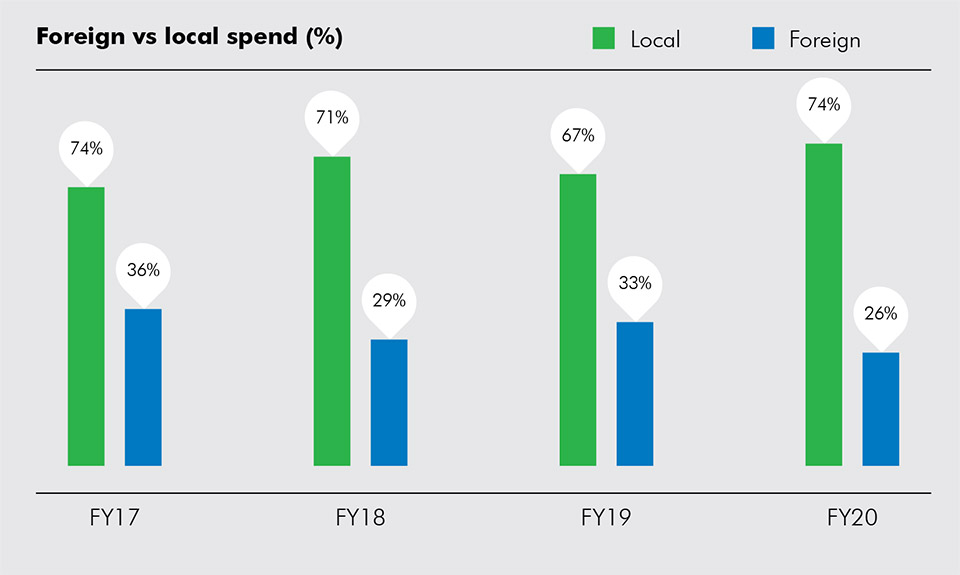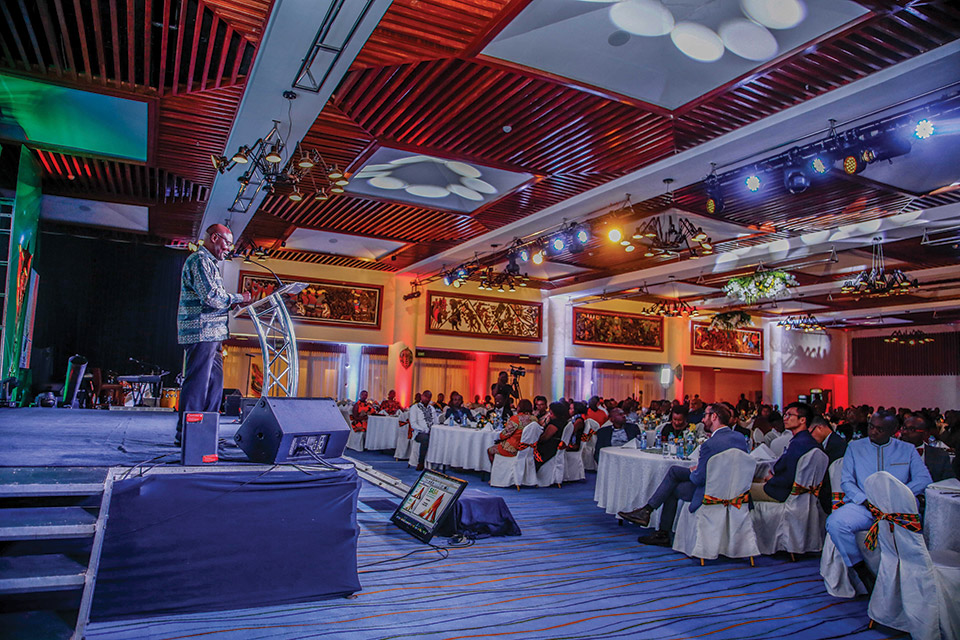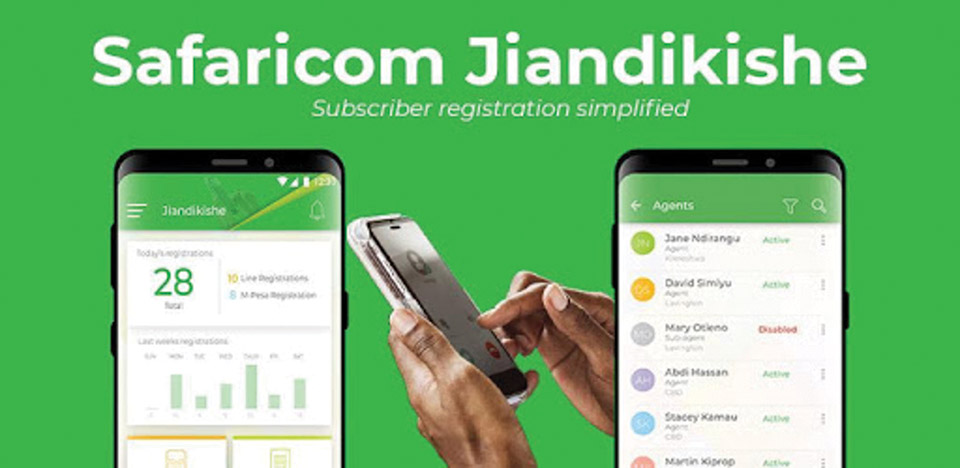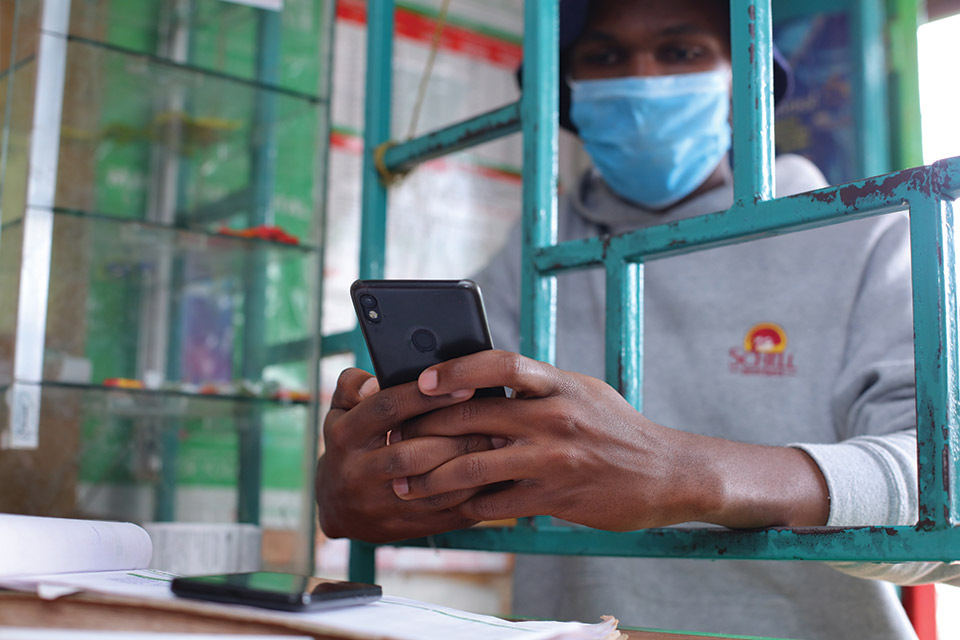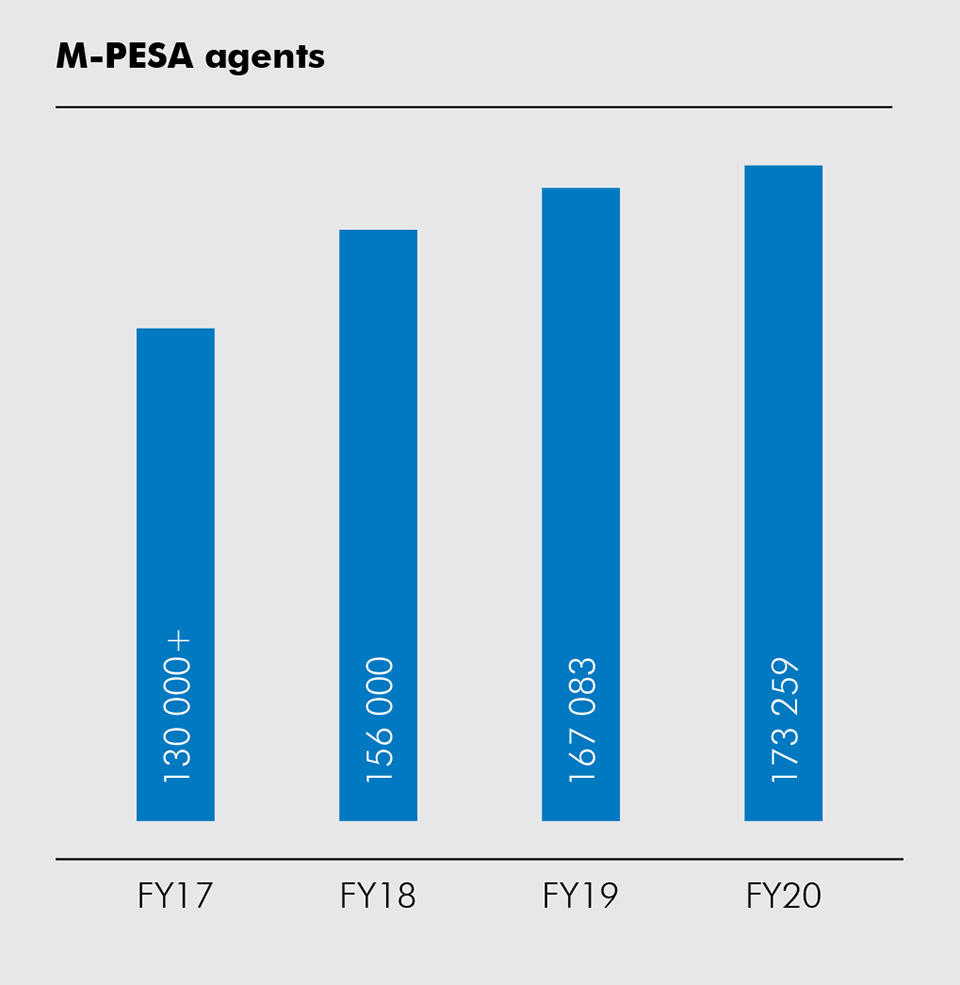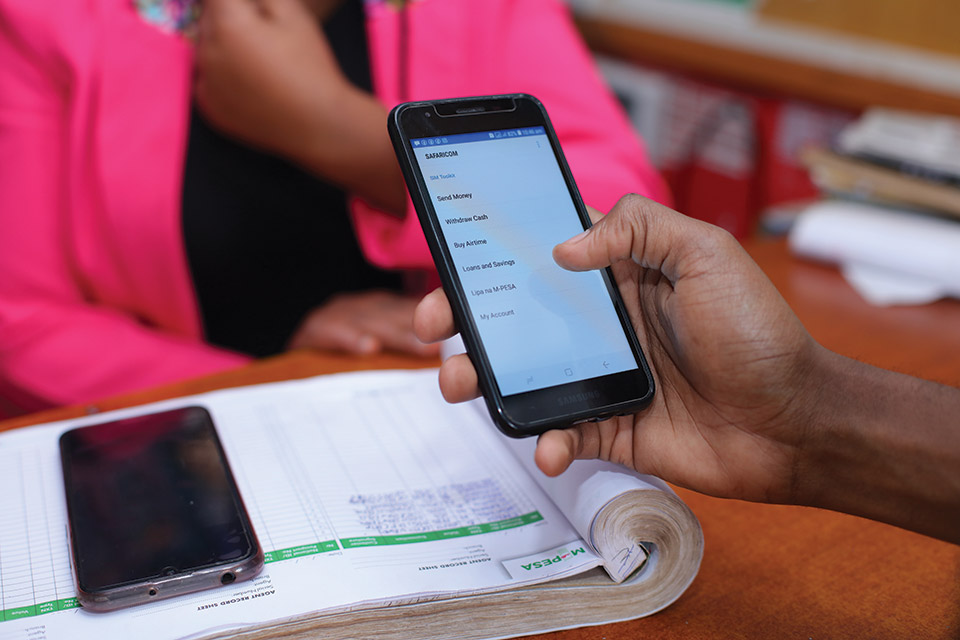Business partners
![]() Supporting our business partners through COVID-19
Supporting our business partners through COVID-19
- All contractors on site have been provided with PPE at no cost.
- We provided stipend cash to 2,960 partner workers and hygiene packs to 3,315 partner workers between April and June 2020
- Support each Dealer Direct Sales Agent with at least one 500 ML sanitizer to use while undertaking their sales activities in the market. The total population supported was 5000 at a cost of KSh 2.5 million.
- Support Dealers Operations as impacts of COVID-19 take toll on Distribution efficiency through KSh 130 million as dealer resource support disbursed over three Months (June, July and August).





As part of our ongoing commitment to the SDGs, we continue to engage with our business partners and to forge new partnerships in the private sector to drive inclusiveness, promote woman owned businesses, provide decent jobs and contribute to economic growth in Kenya.
Our business partners include suppliers, dealers and agents. We rely heavily on our partners from both an operational perspective and in terms of our reputation as they are our interface with many of our other important stakeholders. We also understand that we can play an important role in encouraging sustainable practices throughout our business ecosystem and value chain by engaging with our partners in this regard. Our business partner network is currently comprised of 1 095 suppliers, 440 active dealers and 173 259 M-PESA agents.
Suppliers
Total suppliers and spend

* Received POs during the period
We partnered with 1 095 providers and spent a total of just under KSh 86.7 billion on products and services during the reporting period. As the following table shows, we continue to favour local suppliers where feasible and, on the whole, we are satisfied with the weighting towards Kenyan companies achieved during the year, with a 7 per cent increase of spend with local suppliers and 82 per cent of our providers remaining local companies.
No. of suppliers by category and spend

Encouraging sustainable practices among our suppliers
We continue to undertake performance evaluations of all our suppliers on a quarterly or bi-annual basis. Suppliers are measured against a variety of indicators including cost, quality, delivery, responsiveness, flexibility, value-add, health and safety. A performance score is calculated for our suppliers.
Supplier performance evaluations

We are pleased to report that there was a 69 per cent increase in the number of supplier evaluations conducted during the year, and that average supplier performance improved from 80 per cent to 82.61 per cent over the course of the year. We attribute this to positive relationships with our suppliers and heightened awareness of the purpose of our evaluations and processes, the Symfact contract management portal becoming operational towards the end of the year, and the fact that suppliers are now proactive and promptly seeking performance feedback for their own improvement purposes
We continue to insist that all suppliers sign up to the Code of Ethics for Business in Kenya as well. The Code is based on the principles of the United Nations Global Compact (UNGC). We maintained a similar level to FY19 this year, with of 97 per cent of suppliers with running contracts having signed up to the Code. Suppliers are not invited to take up new business opportunities until they sign up to the Code.
Delivering value to our suppliers
Our overall engagement with our suppliers has improved during the year. We implemented the supplier recognition framework, which culminated in our inaugural Safaricom Annual Partner Awards (SAPA) in April 2019 – a recognition and awards ceremony that was received positively by our community of suppliers. The event allows us to hear supplier concerns and exchange ideas and information with them.
Prior to the awards ceremony, we conducted the Supplier Satisfaction Survey to assess their perceptions and levels of satisfaction and confidence regarding Safaricom. We use the feedback gained through the survey to adjust our processes and offerings to partners. The outcomes of the FY20 survey were an NPS of 73 and an overall satisfaction level of 91 per cent (same scores as FY19).
The main reasons cited for the maintained high levels of satisfaction were the fact that suppliers can now invoice directly as soon as there is confirmation of completion of work, which has resulted in even more prompt payments, and our collaboration with three banks to provide initial and working capital financial support to suppliers that have been awarded contracts. Areas for improvement that were raised by suppliers during the survey included delays in issuance of contracts and purchase orders and the poor levels of communication provided by Safaricom employees
We also engaged with our suppliers during a mini-forum in December 2020. The agenda for the event included our strategy and goals, the importance of committing to the UNGC Code of Ethics for Business in Kenya, and how to use digital technologies to reinvent and accelerate businesses. The mini-forum also allowed suppliers to raise their issues and concerns with us and these have been shared with our entire supplier community since.
Women in Business
We launched our Women in Business (WIB) in March 2017 in recognition of the significant impact empowering women-owned businesses can have on society and reducing inequalities. As part of the WIB programme, we have set ourselves the ambitious target of spending 10 per cent of our total procurement with women-owned and women-led businesses. We continued to focus on building the capacity of WIB companies during the year, enabling them to participate in tenders and, specifically, secure sub-contracting work.
We now have 65 women-owned or led businesses actively receiving business from Safaricom (an increase from 17 in FY18) and 25 new work assignments were awarded to women-owned or led businesses during the year, compared to 16 awards in FY19. We held our annual WIB even in September 2019, which 135 WIB participants attended, and we have continued to grow our list of prequalified womenowned businesses, from 178 to 205, so that, when a specific need arises, no further research needs be undertaken and the prequalified WIB suppliers can be invited to tender.

* Active and/or pre-qualified suppliers
Dealers
Our dealer network remained stable during the year. Overall, our focus has remained on becoming more responsive and transparent with our dealers through the automation and digitisation of our internal processes. We are providing more detailed reports to our dealers, for instance, to enable them to plan better and identify and exploit opportunities more efficiently. We also continued to offer training programmes on basic book-keeping, shop management and life skills.
Our dealers have consistently challenged us to let them take part in other revenue generating activities based on services like fibre-to-the-home (FTTH) and enterprise sales programmes. In response, we engaged with our internal departments and BUs this year in this regard and dealers are now able to serve as Mini Store collections points, FTTH dealers and LNM resellers.
We were unable to host our annual Dealer of the Year Awards (DOYA) due to the COVID-19 restrictions introduced towards the end of the year.
Enhancing KYC through the Jiandikishe App
One of the new ways we delivered value to our dealers during the year was the introduction of the Safaricom Jiandikishe App. By making the subscriber registration process simpler, the app makes it easier for dealers to meet their regulatory obligations and collect KYC registrations in the field. The initiative has largely been successful, with 40 per cent of KYC registrations being collected through the app by March 2020.
How the app works – The user logs into the app and scans the customer Identification document to pick up the customer KYC. This is verified within the app. The customer then selects a number of their choice. The customer receives a notification message to provide consent for registration if this is an additional line that they are purchasing. The process takes approximately three minutes from start to finish.
We further supported dealers by making a subsidised, affordable smartphone available to enable them to take advantage of the app at a greater number of registration points. The MobiGo device has no calling functionalities and, hence, is not susceptible to theft. Payment plans have also been made available, if required. More than 6 000 devices had been purchased by the end of the year.
Chanua Biz 3.0

We enhanced our Chanua Biz promotional campaign for direct sales agents during the year. Dubbed Chanua Biz 3.0, the scheme allows transacting users to earn points, which they can redeem as airtime. Chanua Biz encourages direct sales agents to use M-PESA and Lipa Na M-PESA services to streamline collections and make them cashless. Not carrying cash makes direct sales agents safer in the field by reducing the incidents of theft and lowering insurance costs. As the table notes, the amount redeemed during FY20 was less than the previous year due to budget limitations for Chanua Biz 3.0.
M-Jeki
Twenty dealers joined the M-Jeki platform during the year, bringing the total to 80 dealers. The platform allows dealers and agents to access additional working capital financing (unsecured short-term loans) to purchase airtime and devices, based on their trading history with Safaricom.
Agents
Our network of agents sell airtime, data and M-PESA products and devices. The significant increase in the number of active agents can be attributed to the automation of the agent onboarding process, which has made it far easier and quicker, a change in the parameters used to allocate tills to agents, which has led to an increased number of agents qualifying for additional tills, more active management of agents through regional teams and agent ‘champions’, and a concerted effort to reactivate dormant tills by our regional teams.
Stawisha Biashara
Our loyalty programme for agents, Stawisha Biashara continued to gain traction during the year and KSh 142.7 million has been redeemed since October 2018. The programme awards agents a point for every 1 000 transactions and points can be redeemed as float in their tills.
Delivering value to our agents
In spite of the COVID-19 restrictions introduced towards the end of the year, we were able to hold 11 biannual agent forums in all six regions across the country. We held an Agent Awards event in each of the regions and awarded KSh 20 450 000 in prizes to 118 agent stores and 9 agent head offices. The principal concerns of our agents remain the ability to buy float directly to obtain line allocation and earn commissions, fraud trends and sanctions, security, and logbook availability (the elimination of transaction registers).
In response, we have increased the availability of financing to agent head offices and now have 1 600 agent head offices rotating funds of KSh 1 billion. We also increased the amount of weekend capital financing from KSh 500 million to KSh 800 million. We adjusted the parameters of automated float financing to 50:50, which allows agent head offices that have maintained a float level of KSh 20 000 in 30 per cent of their tills to apply for more tills.
As part of our ongoing efforts to assist agents with their security, we distributed 607 sets of CCTV cameras to 218 agents. To help combat fraud, we distributed 42 500 UV lights to agents to help them detect counterfeit currency.
Engagement with our agents

![]() Looking ahead
Looking ahead
- We will continue to digitise and streamline dealer processes.
- We will continue to support our business partners as they navigate through the challenges brought about by COVID-19.

